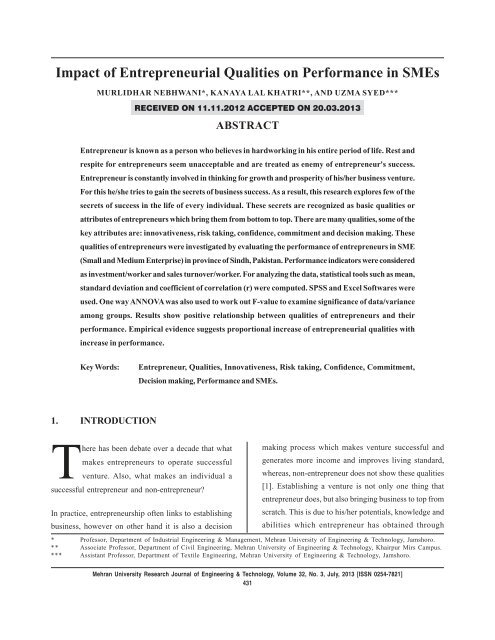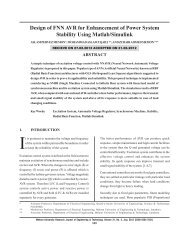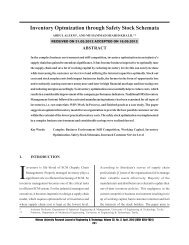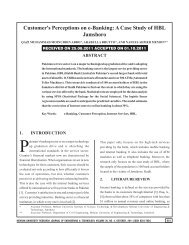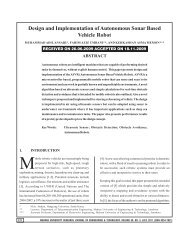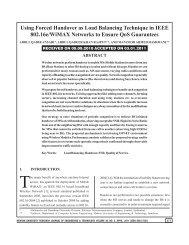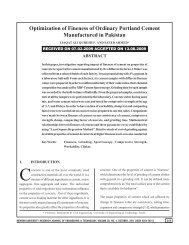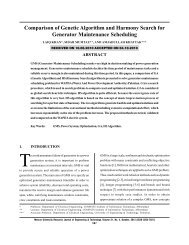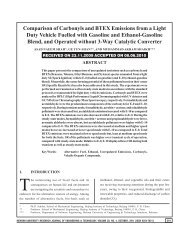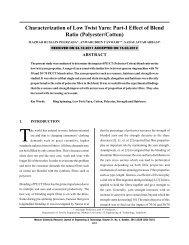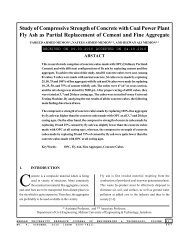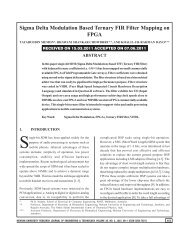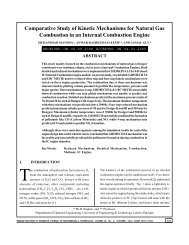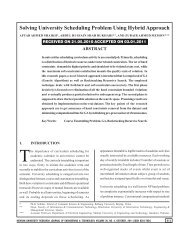(Murlidhar Nebhwani-Kanaya Lal Khatri-Uzma Syed). - Mehran ...
(Murlidhar Nebhwani-Kanaya Lal Khatri-Uzma Syed). - Mehran ...
(Murlidhar Nebhwani-Kanaya Lal Khatri-Uzma Syed). - Mehran ...
You also want an ePaper? Increase the reach of your titles
YUMPU automatically turns print PDFs into web optimized ePapers that Google loves.
Impact of Entrepreneurial Qualities on Performance in SMEsMURLIDHAR NEBHWANI*, KANAYA LAL KHATRI**, AND UZMA SYED***RECEIVED ON 11.11.2012 ACCEPTED ON 20.03.2013ABSTRACTEntrepreneur is known as a person who believes in hardworking in his entire period of life. Rest andrespite for entrepreneurs seem unacceptable and are treated as enemy of entrepreneur's success.Entrepreneur is constantly involved in thinking for growth and prosperity of his/her business venture.For this he/she tries to gain the secrets of business success. As a result, this research explores few of thesecrets of success in the life of every individual. These secrets are recognized as basic qualities orattributes of entrepreneurs which bring them from bottom to top. There are many qualities, some of thekey attributes are: innovativeness, risk taking, confidence, commitment and decision making. Thesequalities of entrepreneurs were investigated by evaluating the performance of entrepreneurs in SME(Small and Medium Enterprise) in province of Sindh, Pakistan. Performance indicators were consideredas investment/worker and sales turnover/worker. For analyzing the data, statistical tools such as mean,standard deviation and coefficient of correlation (r) were computed. SPSS and Excel Softwares wereused. One way ANNOVA was also used to work out F-value to examine significance of data/varianceamong groups. Results show positive relationship between qualities of entrepreneurs and theirperformance. Empirical evidence suggests proportional increase of entrepreneurial qualities withincrease in performance.Key Words:Entrepreneur, Qualities, Innovativeness, Risk taking, Confidence, Commitment,Decision making, Performance and SMEs.1. INTRODUCTIONThere has been debate over a decade that whatmakes entrepreneurs to operate successfulventure. Also, what makes an individual asuccessful entrepreneur and non-entrepreneur?In practice, entrepreneurship often links to establishingbusiness, however on other hand it is also a decisionmaking process which makes venture successful andgenerates more income and improves living standard,whereas, non-entrepreneur does not show these qualities[1]. Establishing a venture is not only one thing thatentrepreneur does, but also bringing business to top fromscratch. This is due to his/her potentials, knowledge andabilities which entrepreneur has obtained through* Professor, Department of Industrial Engineering & Management, <strong>Mehran</strong> University of Engineering & Technology, Jamshoro.** Associate Professor, Department of Civil Engineering, <strong>Mehran</strong> University of Engineering & Technology, Khairpur Mirs Campus.*** Assistant Professor, Department of Textile Engineering, <strong>Mehran</strong> University of Engineering & Technology, Jamshoro.<strong>Mehran</strong> University Research Journal of Engineering & Technology, Volume 32, No. 3, July, 2013 [ISSN 0254-7821]431
Impact of Entrepreneurial Qualities on Performance in SMEsexperience. That is why entrepreneur's judgments anddecisions for company cannot be ignored because ofqualities and capabilities he/she possess [2]. They can beacknowledged as full of potentials such as personalityand psychological behavior, which make them exceptionalfrom non-entrepreneurs; therefore, these potentialitiesboost efficiency and bring positive output [3]. Moreover,success of small businesses is dependent onentrepreneur's abilities to do things differently andsuccessfully which also bring benefit for economy as awhole [4]. Furthermore, there have been vast discussions,thoughts and judgments over features and potentialitiesof entrepreneurs which can be found in various scholarlyjournals and articles, economic and social sciences books,online books and websites. However, after going throughliterature one can also find that there are specific talentsand abilities which differentiate effective entrepreneurfrom un-successful entrepreneur for exampleinnovativeness, risk taking, confidence, commitment anddecision making. However, qualities themselves areidentified important yet ignored. Apart from abovediscussed qualities; additional qualities might also prevailto operate business efficiently and productively. In thispaper, above mentioned qualities are examined in relationto success of SMEs, particularly in developing nations.2. RESEARCH METHODOLOGYIn this paper, research methodology is based uponliterature survey and data analysis. Data was collectedfrom forty (40) SMEs in Sindh province. Two maintechniques viz. qualitative and quantitative were used andcollected data was analyzed in depth. Designedquestionnaire contains two parts, part-1 is concerned withcompanies' background and part-2 is concerned withentrepreneurial qualities.Primary data was gathered from SMEs, considering thepolicy of SMEDA (Small Medium EnterprisesDevelopment Authority), which is framed by theGovernment of Pakistan. Authority provides/suggestssome rules and regulations to be implemented by the SMEsfor boosting the economic growth by generating revenues.According to this policy, any enterprise with paid-upcapital up to PKRS. 25 million, Sales turnover up to PKRS.250 million and workforce up to 250 workers are recognizedas SME [5].The reason behind this research work was to investigatethe consciousness of entrepreneurs and personalattributes as indicated in Table 2 and their impact onbusiness success parameters. In general, impacts ofqualities on the performance of entrepreneurs wereevaluated. For analyzing the data sample statistics, SPSSand Excel Softwares were used.3. REVIEW OF LITERATURETo make any venture successful, one needs to considereffective tool for increasing performance i.e. entrepreneur.Performance is a key factor in entrepreneurship successand can be achieved through personal qualities. Somequalities are usual in entrepreneurs and need to be playedactively because; these are very important in success oftheir business. Often, these qualities can take time toappear or noticed in entrepreneur, such as; education ofan entrepreneur, experience and managerial tactics. Otherqualities can be natural or built-in in individual charactersuch as; innovative personality, risk taking, confidence,commitment to do things and decision making arediscussed.3.1 InnovativenessThe entrepreneurs are often busy and aspiring toenhance services and products. As a result, theyregularly initiate and look for different aspects toimprove business wherever possible. Entrepreneurs are<strong>Mehran</strong> University Research Journal of Engineering & Technology, Volume 32, No. 3, July, 2013 [ISSN 0254-7821]432
⎣Impact of Entrepreneurial Qualities on Performance in SMEsartistic, visionary, hard-worker and creative. Therefore,entrepreneurs often asks themselves as why ventureneed to be modified. That is why many businessmenfocus on different products and services even after longbusiness gain in market. This can be further clarifiedthat many businessmen who possess excellentknowledge of market, many years of experience and alsocapability to run business are now generating low profitor in some cases experience failure. Therefore,companies in progressive business atmosphere havenow established practice to manage diversification ofbusiness portfolio [6]. However, it is not clear yet whatmakes them to start new business in spite of marketunderstanding and experience. However, sincecompanies can emphasize on creating reputation inmarket through innovation and ideas instead ofdiversifying into risky businesses [6]. Therefore, it isentrepreneur who creates atmosphere which upliftsreputation of company in market.An entrepreneur has extraordinary courage to take riskand come up with fresh ideas and promote them in marketaccording to needs [7]. He/She generates ideas bylooking at market opportunities and determines thesources of supply and applies new strategies to produceproduct/service and make sure it is easily available inmarket for sale/use. Therefore, success of smallbusinesses can be measured through business progressand its turnover together with new ideas and innovation[8]. Innovation usually refers to bringing original anddifferent ideas which can be shaped into noveldevelopment [8]. Entrepreneurs must realize thatinnovation and ideas are an important part of successfulbusiness in competitive era. Moreover, innovations andinventions are playing equal role in success of businessin market [9].3.2 Risk TakingEntrepreneur has basic behaviour called risk taking,whereas common people try not to involve in risk taking,if possible. On other hand, entrepreneurs are involvedactively in risk taking which make them successful at theend. It is commonly found in managers that they nevershow off till they achieve their goal out of risk taking. Atone stage researcher says that entrepreneurs who haveconfidence in their ability take more risks accordingly [10].There is profit hidden behind risk therefore; entrepreneur'sfirst step is found to be risk taking; those who believe inrisk taking also believe that there is no business withoutrisk. Furthermore, entrepreneur's level of profit increasesby taking more risk in business, once achieves the goalthey can minimise investment [11].Entrepreneur refers to risk taker and innovative individualwho work towards growth of business and wealth [12].Entrepreneur takes risk in current time because he/sheknows; if project is successful then it will give high returnin future [11]. In addition, entrepreneurs believe in risktaking which is also an opportunity and ultimately bringsbenefit for business in long term [13].3.3 ConfidenceEntrepreneurs motivate everyone with his/her distinctivepersonality of risk taking, intelligence, innovativeness,imitativeness and decision making. In simple word, that isconfidence which make entrepreneur successfulthroughout his careers in business/company. Confidenceis inner feeling of an entrepreneur which is intangible assetfor an individual and cannot be sold physically because itcannot be sensed, affected or heard. More often,entrepreneur leave positive impression among millionpeople within few meetings, it is only because confidenceplays an important role in success.<strong>Mehran</strong> University Research Journal of Engineering & Technology, Volume 32, No. 3, July, 2013 [ISSN 0254-7821]433
Impact of Entrepreneurial Qualities on Performance in SMEsIt is overall noticed that entrepreneur is an individual whodoesn't believe in disappointment, always seems positivefor change, opens doors for new knowledge andexperience even does not hesitate to learn from competitorsand trust himself/herself and finalize task effectively [14].Sometime, entrepreneur takes less risk because of prioritiesbut; that does not affect his/her confidence [10]. It isobserved previously that there is no business withoutrisk. Similarly, there is no decision power withoutconfidence that is why entrepreneur trust on his/herdecision and takes more risks [15].3.4 CommitmentThere is nothing more important than commitment tofinalize the task and no doubt it has no rule. However, it isessential for an individual to be ready to succeed which ofcourse require hard work. Maintaining balanced life onone hand and putting more efforts and time foraccomplishment goals on the other is prerequisite of goodleader. Scholars also indicate that company's success relieson individual's efforts and that is why individual is calledentrepreneur [14]. Moreover, entrepreneurship is themixture of talents and abilities which includes individual'scommitment to grow business by putting efforts,knowledge and skills [14]. Furthermore, entrepreneurshipis individual's own way to increase capital and investmentby taking risks, time management and commitment withcareer [10].Entrepreneurship is an exercise of bringing novel product/service at needed time in market by putting efforts andtaking financial risks to earn personal satisfaction andincome by balancing psychological and social freedom[14]. Also entrepreneur commit him/herself to helpemployees, complete task on time, caring personality andsometime personal sacrifice together with customersatisfaction [10].3.5 Decision MakingEntrepreneurial skills are basic requirement to make anybusiness successful; however, decision making is prerequisiteto enter into entrepreneurial world. They need tobe learned throughout business career and developedduring tough and unpredictable situations. Problems maybe of different nature every time; which may includeproblems with business plan, financial, colleagues ormarketing. However, entrepreneurs take decisiondifferently from common individuals. It is because decisionmaking becomes routine in entrepreneurs' life and theydeal with different situation regularly that is why it isdifferent from common individual [16].The entrepreneurs' decision making process is selfmotivateddue to experience and knowledge gained inroutine, that is why he/she finds better solution whichwould be useful for business [17]. Furthermore,entrepreneur's approach is never pre-planned and alwayson the spot which make him/her better decision makerevery time in all tough situations. Entrepreneur examinesfacts and figures before coming to conclusion. Therefore,it is also known as cautious entrepreneur [18].Entrepreneurs' decisions not only effect inside businessbut also surroundings [19]. Therefore, entrepreneurs needto understand fact and figures before rushing to takedecision in favour or against of anything.4. PERFORMANCE OF ENTREPRENEURSPerformance means doing task to generate productivitywhich can create more profitability. Consequently, if anindividual could not accomplish the expected result, he/she has not performed well enough. In simple words,performance play major role in success of business. It canonly be achieved by persons willingness to complete task<strong>Mehran</strong> University Research Journal of Engineering & Technology, Volume 32, No. 3, July, 2013 [ISSN 0254-7821]434
Impact of Entrepreneurial Qualities on Performance in SMEsentrepreneurs said that this quality is important and theywere rated at 3. In addition 14 entrepreneurs replied that itis more important and they were rated at 4. Whereas 10entrepreneurs mentioned that confidence is mostimportant and they were rated at 5. But none ofentrepreneur in the sample size considered this quality asnot important.Alike; 6 entrepreneurs considered commitment as lessimportant for them and they were rated at 2. In the sameway 12 entrepreneurs informed that this is important andthey were rated at 3. Similarly, 11 entrepreneurs mentionedthat it is more important and they were rated at 4. Alsoother 11 entrepreneurs replied that said quality is mostimportant for them and they were rated at 5. But, no oneamong them considered commitment as not importantquality.Likewise 9 entrepreneurs stated that decision making isless important for them and they were rated at 2. Similarly13 entrepreneurs replied that it is important and they wererated at 3. Also 11 entrepreneurs mentioned that thisquality is more important and they were rated at 4. In thesame way, 7 entrepreneurs said that this is most importanttherefore, they were rated at 5. But, none of entrepreneurconsidered that this quality is not important for them.Analysis further reveals that the entrepreneurs understudy were also inquired to mention the investment,turnover and employment of your enterprises, since theseparameters are considered as key business variables.Therefore, they were provided the fixed options to replythis section, and response of the entrepreneurs is sum upand mentioned in Table 2.Moreover; performance of entrepreneurs was evaluatedon the basis of these important business variables. Amongthese variables two pairs i.e. turnover/worker andinvestment/worker were set. To know the degree ofrelationship between these pairs, coefficient of corelation(r) was computed as 0.85 and 0.79 respectively.Table 2 reflects enterprises from where data for variousbusiness variables was obtained for this research work.Analysis reveals that there were 10-25 workers with 05-10million investment and 25-50 million sales turnover in glassmanufacturing industries. Similarly, 25-75 workers with 10-25 million investment and 50-200 million sales turnover ingarments industries. Likewise, 25-100 workers with 15-25million investment and 100-250 million sales turnover inrice husking industries. Also, 25-100 workers with 15-25million investment and 50-200 million sales turnover inauto parts manufacturing industries. In the same way, 50-100 workers with 15-25 million investment and 150-250million sales turnover in cotton and ginning industries.Data was statistically analyzed i.e. mean of these variableswas estimated. Then variables were normalized to identifyTABLE 2. BACKGROUND OF ENTERPRISES AND BUSINESS VARIABLESNature of Number of Investment Sales TurnoverEnterprises Workers (PKRS. M) (PKRS. M)Glass Manufacturing 10-25 05-10 25-50Garments Industries 25-75 10-25 50-200Rice Husking Industries 25-100 15-25 100-250Auto Parts manufacturing 25-100 15-25 50-200Cotton & Ginning Industries 50-100 15-25 150-250<strong>Mehran</strong> University Research Journal of Engineering & Technology, Volume 32, No. 3, July, 2013 [ISSN 0254-7821]436
Impact of Entrepreneurial Qualities on Performance in SMEsthe investment per worker and sales turnover per workerin sample size. It was found that minimum investment perworker was Rs. 0.20 million and maximum Rs. 0.74 millionwith an average of Rs. 0.37 million. Whereas, minimumsales turnover per worker was Rs. 1.99 million andmaximum Rs. 4.62 million with an average of Rs. 3.11million.To know the impacts of entrepreneurial qualities onperformance, entrepreneurs were classified in three groupson the basis of their sales turnover per worker. Therefore,07 entrepreneurs belonged to group 1 whose investmentand sales turnover per worker was 0.37 and 2.06 millionrespectively. Similarly, 18 entrepreneurs belonged to group2 whose investment and sales turnover per worker was0.32 and 2.84 million respectively. Likewise, 15entrepreneurs lay in group 3 whose investment and salesturnover per worker was 0.42 and 3.93 million respectively.Using sample statistics, mean and standard deviation fordegree of importance to qualities assigned by each groupof entrepreneurs and overall sample size were computedas shown in Table 3.To identify the significance of data/variance among groupson 95% confidence level, ONE WAY ANOVA was applied,for this purpose criteria p=< 0.05 was recommended andF-value of the analysis between various groups of allqualities was recorded to be significant since; p value was0.00
Impact of Entrepreneurial Qualities on Performance in SMEsaverage was computed as 2.00, 2.83 and 3.80 respectivelywith an overall average of 3.05 degree. Whereas standarddeviation for above groups was also computed as 0.82,0.62 and 0.68 respectively with an overall average of 0.93.It is seen from the results that entrepreneurs of G1, G2 andG3 consider this quality as less important, important andmore important respectively but; none of entrepreneurconsiders it as a most important. As whole entrepreneursin sample size consider risk taking only as importantquality.Similarly degree of importance on scale to confidencewas recorded for groups 1, 2 and 3 entrepreneurs and anaverage was computed as 2.71, 3.61 and 4.47 respectivelywith an overall average of 3.78 degree. Whereas standarddeviation for above groups was also computed as 0.49,0.70 and 0.74 respectively with an overall average of 0.92.It is seen from the results that entrepreneurs of G1consider this quality as important, G2 and G3 consider itas more important respectively but; none of entrepreneurconsiders it as a most important. As whole entrepreneursin sample size consider confidence as more importantquality.In the same way degree of importance on scale tocommitment was recorded for groups 1, 2 and 3entrepreneurs, and an average was computed as 2.57,3.33 and 4.47 respectively with an overall average of3.62 degree. Whereas standard deviation for abovegroups was also computed as 0.54, 0.84 and 0.74respectively with an overall average of 1.03. It is seenfrom the results that entrepreneurs of G1 and G2consider this quality as important and G3 consider it asmore important respectively but; none of entrepreneurconsiders it as a most important. As wholeentrepreneurs in sample size consider commitment asmore important quality.Also degree of importance on scale to decision makingwas recorded for groups 1, 2 and 3 entrepreneurs and anaverage was computed as 2.43, 2.94 and 4.33 respectivelywith an overall average of 3.37 degree. Whereas standarddeviation for above groups was also computed as 0.54,0.73 and 0.72 respectively with an overall average of 1.03.It is seen from the results that entrepreneurs of G1, G2 andG3 consider this quality as less important, important andmore important respectively but; none of entrepreneurconsiders it as a most important. As whole entrepreneursin sample size consider decision making only as importantquality.Analysis further reveals that entrepreneurs of G1, G2and G3 consider innovativeness, risk taking anddecision making as less important, important and moreimportant qualities respectively but; none ofentrepreneur of these groups considers these qualitiesas a most important. As whole entrepreneurs in samplesize of these groups also consider these only asimportant qualities. Similarly entrepreneurs of G1consider confidence as important, G2 and G3 considerit as more important. Likewise entrepreneurs of G1 andG2 consider commitment as important and G3 considerit as more important respectively but; none ofentrepreneur also considers confidence and commitmentas most important qualities. As whole entrepreneurs insample size consider confidence and commitment asmore important qualities.6. PERFORMANCE EVALUATIONTo evaluate the impact of entrepreneurial qualities onperformance in terms of average investment per workerand average sales turnover per worker, comparison havebeen made for each group as indicated in Table 4.<strong>Mehran</strong> University Research Journal of Engineering & Technology, Volume 32, No. 3, July, 2013 [ISSN 0254-7821]438
Impact of Entrepreneurial Qualities on Performance in SMEsTABLE 4. PERFORMANCE OF ENTREPRENEURSComparison of Investment Per Worker and Sales Turnover Per Worker of Each Group (PKRS. In Million)GroupsAverage Investment/Worker Average Sales Turnover/Worker Comparison of(A) (B) (A) and (B)1 0.37 2.06 (B) 5.57 times > (A)2 0.32 2.84 (B) 8.88 times > (A)3 0.42 3.93 (B) 9.36 times > (A)Table 4 reflects that an average turnover per worker ofentrepreneurs belong to group 1, 2 and 3 was Rs. 2.06, Rs.2.84 and Rs. 3.93 million respectively with an averageinvestment per worker of Rs. 0.37, Rs. 0.32 and Rs. 0.42million respectively. Furthermore, average sales turnoverper worker of group 1 entrepreneurs was 5.57 times higheras compared to their average investment per worker.Whereas average sales turnover per worker of group 2and 3 entrepreneurs was 8.88 and 9.36 times higher ascompared to their average investment per workerrespectively.Furthermore; entrepreneurs of G1 considerinnovativeness, risk taking and decision making as lessimportant qualities whereas; they consider onlyconfidence and commitment as important. Thereforetheir performance is achieved as lower among all groups.Similarly, G2 entrepreneurs consider innovativeness,risk taking decision making and commitment asimportant qualities whereas; they consider onlyconfidence as more important. Therefore; theirperformance is achieved as moderate among all groups.However, G3 entrepreneurs consider all these qualitiesas more important. Therefore their performance isachieved as higher among all groups.7. CONCLUSIONAn effective entrepreneur is a person who is not onlycompetent to bring new product/service in market butalso making venture top of the market. The potentialsand qualities are assets for an entrepreneur, which helphim/ her to do business effectively and take decisionson proper time. The link between characteristics ofentrepreneurs and business performance wereevaluated. It was confirmed that there is strongrelationship between business performance andentrepreneurial qualities. Study also found out thatpositive result is backed by qualities of entrepreneurs.As the qualities increase proportionally performancealso increases. Therefore, it is concluded that venture'ssuccess lies on entrepreneurial qualities. Furthermore,qualities discussed above are most beneficial indeveloping countries environment like Pakistan, Indiaand in such developing countries. It is becausedeveloping countries are altering their needs andmoving towards success. Therefore, if enterprises arewilling to increase the performance, must focus ondevelopment of qualities in entrepreneurs. It is alsonoticed that entrepreneurs are well aware of thesequalities and strengths, but more often forget to adoptand apply.ACKNOWLEDGEMENTAuthors are thankful to the Owners/Entrepreneurs andstaff of Small and Medium Enterprises considered in thisresearch for providing required information andcooperation.<strong>Mehran</strong> University Research Journal of Engineering & Technology, Volume 32, No. 3, July, 2013 [ISSN 0254-7821]439
Impact of Entrepreneurial Qualities on Performance in SMEsREFERENCES[1] Ismail, N., Jaffar, N., Khan, S., and Leng, T.S., "Trackingthe Cyber Entrepreneurial Intention of PrivateUniversities Students in Malaysia", International Journalof Entrepreneurship and Small Business, Volume 17,No. 4, pp. 538-546, 2012.[2] Casson, M., "Entrepreneurship and the Theory of theFirm", Department of Economics, University of Reading,Elsevier BV, UK, 2005.[3] Ndubisi, N.O., "Integrating the Moderation Effect ofEntrepreneurial Qualities into the Tam Model andTreatment of Potential Confounding Factors", Journalof Information Science and Technology, Volume 2,No. 1, pp. 28-48, 2005.[4] Love, J.H., Roper, S., and Bryson, J.R., "Openness,Knowledge, Innovation and Growth in UK BusinessServices", Research Policy, Volume 40, No. 10,pp. 1438-1452, 2011.[5] SME Policy, "Policy Planning & Strategy Department",Ministry of Industries & Production, Government ofPakistan, 2007.[6] Rumelt, R.P., "Theory, Strategy and Entrepreneurship",International Handbook Series on Entrepreneurship,Business and Economics, Volume 2, University ofCalifornia, Los Angeles, 2005.[7] Petuskiene, E., and Glinskiene, R., "Entrepreneurship asthe Basic Element for the Successful Employment ofBenchmarking and Business Innovations", InzinerineEkonomika-Engineering Economics, Volume 22, No. 1,pp. 69-77, 2011.[8] Harmeling, S., "Contingency as an EntrepreneurialResource: How Private Obsession Fulfils Public Need",Journal of Business Venturing, Volume 26, No. 3,pp. 293-305, 2011.[9] Fagerberg, J., "Innovation: A Guide to Literature", Centerfor Technology, Innovation and Culture, University ofOslo, October 12, 2003.[10] Gani Hamzah, M.S., Yusof, H.B., and Abdullah, S.K.,"Headmaster and Entrepreneurship Criteria", EuropeanJournal of Social Sciences, Volume 11, No. 4, 2009.[11] Hopenhayn, H.A., "Risk Taking by Entrepreneurs",University of Rochester and Universidad Torcuato DiTella Galina Vereshchagina, CERGE-EI, December 4,2002.[12] High, J., "Economic Theory and the Rise of Big Businessin America, 1870-1910", Business History Review,Volume 85, No. 1, pp. 85-112, 2011.[13] Murmann, J.P., and Sardan, D., "Successful EntrepreneursMinimize Risk", Australian Journal of Management,pp. 1-25, University of New South Wales, Sydney, NSW2052, Australia, 2012.[14] Ministry of Higher Education (KPT), "The Foundationof Entrepreneurship Culturing", UUM Sintoh: Publisherof Universiti Utara Malaysia, 2007.[15] Vecchio, R.P., "Entrepreneurship and Leadership:Common Trends and Common Threads", HumanResource Management Review, Volume 13,pp. 303-327, 2003.[16] Schade, C., and Burmeister-Lamp, K., "Experiments onEntrepreneurial Decision Making: A Different LensThrough Which to Look at Entrepreneurship",Foundations and Trends in Entrepreneurship, Volume 5,No. 2, pp. 81-134, 2009.[17] Ivanova, E., and Gibcus, P., "The Decision-MakingEntrepreneur, Literature Review", EIM Business & PolicyResearch, Scales, Scientific Analysis of Entrepreneurshipand SMEs, 2003.[18] Nichols, D., "Decision Making and the Entrepreneur",Enzinearticle.com, 21 February, 2007.[19] Richardson, S., and Ndubisi, N.O., "Strategic-LevelSystems in Decision-Making by Entrepreneurs: TheAntecedents of Systems Usage", Strategic Level Systems,The Journal of Business in Developing Nations,Volume 7, 2003.[20] Jong, B.A.D., and Elfring, T., "How Does Trust Affectthe Performance of Ongoing Teams? The MediatingRole of Reflexivity, Monitoring and Effort", Academyof Management Journal, Volume 53, No. 3,pp. 535-549, 2010.[21] Jagtap, K.N., "Rural Women Entrepreneurs-Opportunities and Challenges", Golden ResearchThoughts, Volume 1, No. 12, pp. 1-4, 2012.[22] <strong>Nebhwani</strong>, M.D., Marri, H.B., and Sohag, R.A., "Effectsof Entrepreneurial Types on Turnover in SMEs", AnEmpirical Analysis, <strong>Mehran</strong> University Research Journalof Engineering & Technology, Volume 29, No. 2,pp. 347-356, Jamshoro, Pakistan, April, 2010.<strong>Mehran</strong> University Research Journal of Engineering & Technology, Volume 32, No. 3, July, 2013 [ISSN 0254-7821]440


